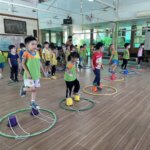"Principal, I don't have any friends? I don't have anyone to play with." The little boy came to me and complained. It is important to look at a child who is usually so lively, but suddenly sends out signals of distress.
During assembly, we shared with the children about friends and then asked, "Please stand up if you don't have any friends in kindergarten." Less than ten children stood up from the older classes to the younger ones. One by one, the principal asked the children who they would most like to be friends with. The children expressed themselves clearly; then, in order, they were asked to find the courage to walk up to the friend they wanted and say, "Can I be friends with you? If they want to, they say "yes" and shake hands and hug each other.
Under the guidance of the principal, the children who expressed themselves that they had no friends were courageous and willing to express their needs in front of others, looking for support, and were helped to build a bridge of friendship with each other as they wished; then we played a good friend guessing game ¡V Let's be good friends, let's salute, let's shake hands, let's guess, let's see who will win the game of Stone Cloth, and the loser will have to leave with me. We play together and have fun.
During the process, we observed that children have strong and sensitive expression and appreciation, and that the homogeneity of the friends they play with is very high and similar. Nevertheless, in the process of getting along with each other, there are often quarrels, mutual disrespect, pushing, crowding, grabbing, and petting each other. In the process of pushing, crowding, and grabbing, some children may cry, complain, or get injured accidentally, and they may also turn their faces away from each other, and these behaviors and situations may not necessarily take place in the classroom, but may occur outdoors, in the toilet, and the teachers may not be aware of it; however, there are children who will complain, and the descriptions of the situation may differ from one person to another. If the incident is related to them and they are not in the right, they will defend themselves and avoid the issue by saying that it is someone else's fault.
If parents understand, it will be easier to deal with them. Otherwise, teachers may not be able to deal with the disputes of children alone.
As children learn, play and argue, building relationships with others is an important process of growth and the beginning of socialization and interpersonal interaction; sometimes parents complain why their children have no friends. In fact, it is impossible to force them to have friends. In addition to personal characteristics, affinity, gentle attitude, politeness, and courtesy, parental care is also very important. In the early childhood stage, there is a high degree of plasticity, so we must grasp this period to learn, change and adjust in order to establish good interpersonal interactions.
While family is the pillar of support for a lifetime, friends are the ones you can always count on.
The Mixed Age Learning Zone, held once every two weeks, is a favorite of the children. There are table games, science and cooking area, art and clay area, and drama area, and the children are free to choose their favorite area, and under the attentive planning of the teachers, they will have a different experience, enriching their learning and interpersonal interaction experience.
Have a nice vacation. Peace and happiness.
Mandy




